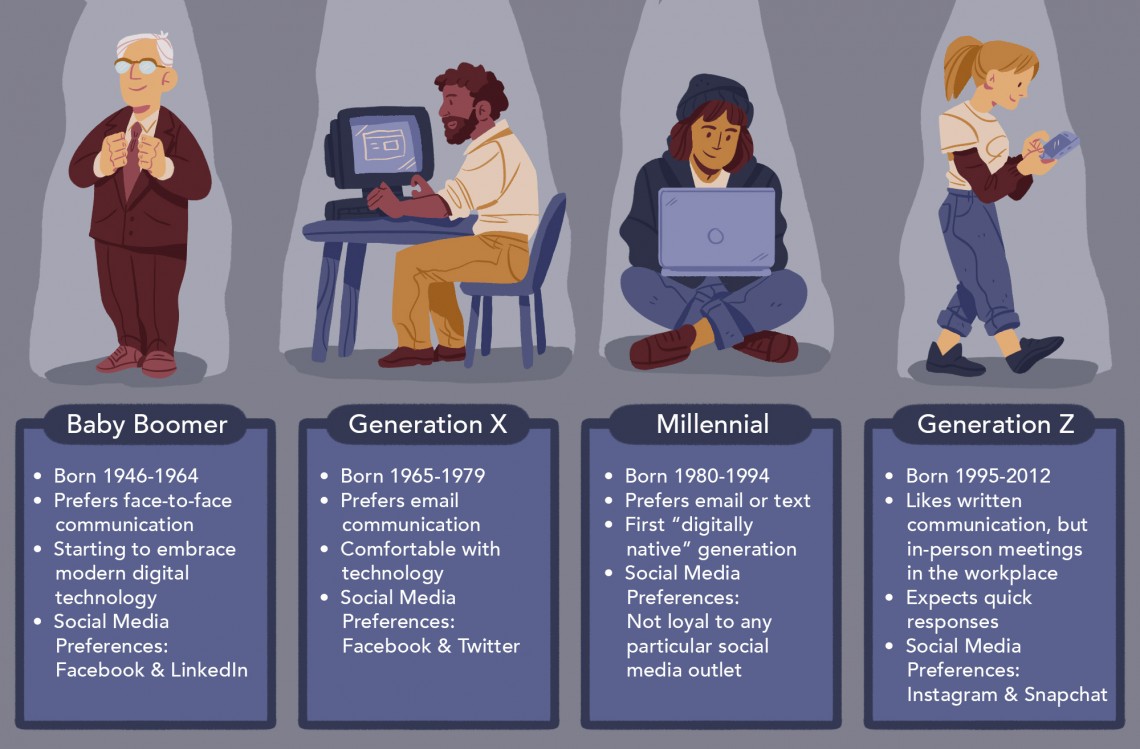While my previous blog posts have been all about exploring the conventions of documentaries as a medium themselves, and how to best approach this project from an artistic and cinematic standpoint, these next series of sources analyses will now begin to delve into actual subject matter research, that is, what is Generation Z, what are their characteristics and what separates them (us) from other generations. Of course, I already knew the definition of Gen Z—on the surface level anyway—those born between 1997 and 2012, and between the ages of 10 and 25 years old today, but I need to go much deeper. I needed to discover what separates us from the generations before us, and just what it means to be a digital native—and how that influences the way in which we operate and are perceived in society.

DEFINING GENERATIONS: WHERE MILLENNIALS END AND GENERATION Z BEGINS
The first source I looked at to learn more about Generation Z and what separates them from previous generations such as Millennials was an article by Pew Research Center, titled, Defining generations: Where Millennials end and Generation Z begins. First, it began with what shaped Millennials and their outlook, including the economic and political climate at the time, and how that impacted their entrance into the workforce. The article discussed how most Millennials were between the ages of 5 and 20 when the 9/11 terrorist attacks took place, while the majority of Gen Z have no memory of such an event. Millennials also grew up “in the shadow” of the Iraq and Afghanistan wars, a time of great “political polarization” that still affects us today, and were between 12 and 27 during the 2008 election, seeing firsthand the power of the youth vote as it helped to elect the first black president. These factors are all reflective of the emergence of the “most racially and ethnically diverse adult generation in the nation’s history” (Dimock, 2019), topped only recently by Generation Z.
Aside from the political state of the time, the economy also played a large role in impacting Millennials’ emergence into the workforce and US market. The economy was at the height of the recession when many Millennials first entered the workforce, and consequently, their “life choices, future earnings and entrance to adulthood have been shaped by this recession in a way that may not be the case for their younger counterparts” (Dimock, 2019).
Finally, technology also played a key role in defining generational differences. While Generation X grew up during the beginning of the computer revolution, Millennials grew up during the internet explosion, and Generation Z, during the emergence of smartphones. What makes Gen Z so unique from a technology standpoint, is that they were the first to grow up with every innovation of their predecessors, such as the TV, computer and internet, and every step forward after this, such as the invention of the iPhone, high-speed data, and the widespread use of social media, occurred during Generation Z’s coming of age, ultimately affecting their very basis of communication and interaction.

This information is critical in the development of my project, specifically in allowing me to better understand what separates these generations throughout time. After reading this research article, I was able to conclude that among the largest factors of intergenerational separation that often contributes to a certain social and ideological disconnect between disparate age groups is the means of communication that was predominant during that time. This illustrates the power of communication and media in not only shaping the very world and society and culture around us, but its ability to impact our futures for decades through generational trends.
GEN Z ARE NOT ‘CODDLED.’ THEY ARE HIGHLY COLLABORATIVE, SELF-RELIANT AND PRAGMATIC, ACCORDING TO NEW STANDFORD-AFFILIATED RESEARCH
The next source I analyzed was an article from Stanford News about the characteristics and misunderstandings of Generation Z in the form of a Q & A interview with Roberta Katz, a senior research scholar at Stanford’s Center for Advanced Study in the Behavioral Sciences (CASBS). When asked to briefly describe the typical Gen Zer, she responded by saying, “a typical Gen Zer is a self-driver who deeply cares about others, strives for a diverse community, is highly collaborative and social, values flexibility, relevance, authenticity and non-hierarchical leadership, and, while dismayed about inherited issues like climate change, has a pragmatic attitude about the work that has to be done to address those issues” (De Witte, 2022). Further, she added that an internet-connected society has benefited Gen Zers in that they were exposed to digital tools at a young age in which they could learn about different cultures from around the world and thus developed a “greater appreciation” for diversity and finding their own identities.
When asked what most people misunderstand or get wrong about Gen Zers, Katz said that, as a whole, the generation is often wrongfully regarded as being too “soft” something that she believes stems from the misunderstanding of what growing up in the present day is like compared that of our elders. Much of the criticism received by younger individuals within this demographic, such as not having an after-school job or not yet having a driver’s license, can be justified by the easily-accessible digitization of everyday life to such a degree that, many of these things do not present the same sense of urgency that they once did. Finally, Katz added that she believes that Generation Z gets a bad rap, however, it is changing as people are beginning to realize the “strength and pragmaticism” and potential of Gen Zers.
This article in particular provides great value to my project’s development in that it allows me to begin to see where the misconceptions surrounding Gen Z stem from, and the reasoning behind them. Also, by better understanding these misunderstandings, I can more accurately identify them, break them down and potentially dispel them through the interviews in my documentary. Ultimately, the main goal of this project is to allow Generation Z to be better heard and understood, and I can accomplish this in a greater sense but first understanding these intergenerational disconnects and why they exist, and then going about ways to bridge those gaps in communication.
CITATIONS
De Witte, M. (2022, January 3). What to know about gen Z. Stanford News.
Dimock, M. (2022, April 21). Defining generations: Where millennials end and generation Z begins. Pew Research Center.
